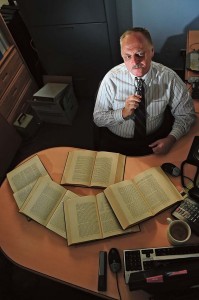History is the record of past events and is important to the future of a society. History affects what we do on a daily basis. Some may say the lack of knowledge of how and what happened in the past can be the reason history repeats itself.
At Ramstein, Silvano Wueschner is the historian of the 86th Airlift Wing. As an organization, it’s important to have a record of past events so educated decisions can be made in the future. During an interview, Wueschner discussed more about his position and what it entails.

Q: Have you previously served in the military? If so, what was your specialty?
A: I served for 10 years with the Marine Corps during the ’70s. I started off as a military police and since I had a year and a half of college when I went in, they wanted me in what would be today’s equivalent of knowledge operations. I also had a secondary specialty as a drill instructor at Parris Island (Marine Corps Recruit Depot), S.C. I was an administrative chief at Parris Island for a few years. I ended up getting drafted around 1971, during the Vietnam War. The Air Force was a close second for me, but I was infantry motivated so I joined the Marines. The Marine Corps was great. It was a small family. Out of the four active branches, it was the smallest organization, and the camaraderie was great.
Q: Out of that year and a half of schooling, was any of that related to your job now?
A: No, other than the general history classes I took, it was all general education courses. That was my first year and a half of college.
Q: Exactly what are your duties as the wing historian?
A: To capture the history of the unit I’m assigned to, whether it’s here at Ramstein with the 86th or downrange when deployed. In other words, make sure nothing falls through the cracks.
Q: What were the educational requirements to get this job?
A: For this job you had to have 18 credit hours of history or Ph.D. preferred. In other words, you really didn’t have to have a Ph.D. or a master’s degree, as long as you had 18 hours of history. The colonel at the time wanted someone with the most education, but that was the minimum.
Q: Were you a history teacher?
A: Yes, I was a history professor prior to coming into the Air Force program.
Q: How long have you been in this position?
A: I’ve been here at Ramstein since June of 2011. Prior to that, I was at Maxwell Air Force Base Air University (Alabama) from July 2004 and spent seven years there.
Q: How long do you think you’ll remain in this position?
A: As for how long I’ll be in this position really depends on what options are available in terms of upward mobility. I do miss teaching a lot.
Q: What’s the best part about your job?
A: The best part would be coming to work. When you like your job and it’s fun, it’s easy to come to work. It’s tough deploying, but even then it’s fun because you feel like you’re a part of something important. You feel like you’re making a real contribution, and that’s where the rubber meets the road as they say.
Q: Do you believe that the past affects the future?
A: Yes, absolutely. Decisions that were made 100 years ago still affect us today. I did have a professor at the University of Iowa who cautioned me one time. He said, “As much as we’d like to, we can’t always go back to the Garden of Eden.”
Q: How does your job affect Airmen on a daily basis?
A: If I do my job and I do it properly, it affects them in terms of good decision-making by leadership. Airmen are the ones who have to carry out the tasks. I’m not saying I’m solely responsible for that, but leadership can make informed decisions based on the information they receive about the past.
Q: Is there anything you would like to add about your job that people wouldn’t necessarily think about when they think of a historian?
A: We’re motivators too. We’re the keepers of the motivational aspect of the wing. We can take you all the way back to who and when the base was founded, all of the accomplishments, all of the lineage and honors. People don’t necessarily look at us as having that kind of information or being the keepers of the treasure trove of motivation. We provide some of the young Airmen with a reason to come work. Some Airmen come in and they don’t understand who they are and what the mission is, and they’re just here. But we can make a connection. We can help you come to work and make you smile.


